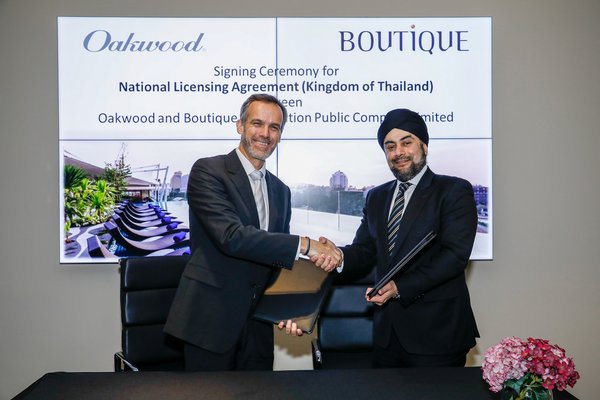 Fourteen years ago Yuthachai Charanachitta returned home to Thailand after finishing college in upstate New York. He was 24 and had spent half his life studying in the U.S. Before joining the family company, he planned to gain outside experience. But he had barely started consulting work at KPMG when disaster struck.
Fourteen years ago Yuthachai Charanachitta returned home to Thailand after finishing college in upstate New York. He was 24 and had spent half his life studying in the U.S. Before joining the family company, he planned to gain outside experience. But he had barely started consulting work at KPMG when disaster struck.
A small-plane crash in April 2003 claimed the life of his father, Adisorn Charanachitta. Yuthachai’s mother, Nijaporn Charanachitta, stepped in, and she and her brother Premchai Karnasuta ran Italian-Thai Development. Their father, Chaijudh Karnasuta, founded the 60-year-old construction-and-engineering company, which had built much of Bangkok, from the subway system to Suvarnabhumi Airport.
The family’s portfolio also included hotels, and that’s where Yuthachai checked in after switching plans and signing onto the family business. Its properties included the Amari brand, plus the Mandarin Oriental Hotel, the 140-year-old riverside gem that’s hosted presidents, princes and writers from Richard Nixon to Joseph Conrad. Even when he was a child, hotels cast a spell over him. “I remember all the times going with my father for meals at the Oriental. I loved the hospitality and got to know the staff. It really felt like family.”
Soon he was making the rounds of properties, working a few months at the Oriental, learning the trade. Still in his 20s, he was already married, had started his own family and was running the hotel division. “Life moved fast,” he recalls. “I had to jump in quickly.”
In contrast, Italthai Group’s hotel division was successful but was totally entrenched in Thailand. Such a strategy is fine for a unique gem such as the Oriental, Thailand’s first international hotel. Nowadays, though, the hotel industry is dominated by global behemoths with thousands of rooms and myriad brands. The trend is toward vast scale, as exemplified by the recent megamerger of Starwood and Marriott.
Italian-Thai evolved from a partnership between Yuthachai’s grandfather, Chaijudh, a Thai doctor, and Giorgio Berlingieri, an Italian who ran a dredging business in Vietnam. In 1954 they salvaged some ships sunk in Bangkok’s Chao Phraya River, then formed a firm that specialized in construction, engineering, trading and eventually tourism. Berlingieri died in 1981, leaving the business to the Karnasutas.
With tourism the family was an accidental pioneer. Its first property, Nipa Lodge, opened 50 years ago in Pattaya, a seaside area that offered R&R to American GIs during the Vietnam War. Italian-Thai built the property, then when the owner had problems, stepped in to operate it. Other properties followed, and in 1992 it rebranded the collection as Amari. But two decades later Amari still counted fewer than a dozen properties, all in Thailand.
Yuthachai, 38, envisioned a quantum leap for the company, not only from its base in Thailand but also beyond its comfort zone of providing four-star lodging. “One-brand strategy,” he explains, “that isn’t enough room for us to grow.” In 2010 he formed a new company, Onyx, to hold most of the hotel assets and recruited longtime British hotel executive Peter Henley as CEO. This was part of a ten-year strategy, and nothing was off the table: management contracts, acquisitions, new brands, overseas growth. “We have a clear road map to expand from 10 properties to 51 by 2018,” he says. “Right now we are approaching 40 properties. So we are on track.”
New brands such as buzzy OZO were launched, and management deals were signed. Amari opened in Doha and Dhaka in the last two years and in January launched a resort in the Maldives. Next will be the first Amari in Malaysia. OZO recently opened its fourth hotel in Kandy, Sri Lanka and will soon add Vietnam. Everyone in the travel industry eyes China; Onyx expanded into the mainland by acquiring Shama, a Hong Kong company specializing in serviced apartments in China. Yuthachai plans to export his other brands to China but also sees Shama as a good fit around the region.
Yuthachai, who now serves as Italthai Group’s CEO, admits wrangling with his mother, who is 65 and the unlisted group’s chairman. “My mother is all about financial return. She’s a numbers lady.” He says he’s more keen on long-term vision and describes himself as aggressive, “maybe because of my years in America. I’m very much hands-on.”
Clashes were inevitable, especially since selling the plan to the family and investors was complicated by the grand scale of the ambition. Yuthachai was moving in so many directions at the same time–launching hotel brands and a spa brand, adding food-and-beverage outlets and opening offices around the region–that costs kept piling up. “The early part of the plan involved investment in [technology] systems, hiring staff and training, things that cost a lot,” explains Henley, who trained as an attorney but also has extensive executive experience with hotels in Asia. Yet Yuthachai says his mother stayed confident. “She allowed me to make decisions, to have the ability to lead in my own way.”
Onyx’s revenue reached $180 million last year, according to company officials. (The overall revenue for the group–which is separate from Italian-Thai Development–totals roughly $500 million annually, with the rest coming from construction services, engineering for wind and solar power, heavy equipment and beverage distribution.) Onyx won’t divulge profits, but Henley says it is in the black.
In Asia few have pulled off transitioning from a single hotel brand targeting one sector of a market in just one country to an international competitor with multiple brands. Chains such as Aman, Peninsula and the Mandarin Oriental Hotel Group (which runs and co-owns Bangkok’s Mandarin Oriental in a long partnership with Yuthachai’s family) are successful, but all focus on one segment, the high-end market.
A better comparison is with billionaire Bangkok hotelier William Heinecke, whose properties were managed by Four Seasons, Marriott and other chains. Then he launched his own Anantara brand. Now his Minor Hotel Group also has Avani hotels, management deals, branded spas and a broad array of food-and-beverage outlets. “Everyone can see a shining example with Minor,” says Robert Hecker, Singapore managing director for Horwath HTL, a hotel consultancy that advised on the Onyx plan. “But it’s not that easy. With Amari there was a lot of debate about which way to go. [Italthai] wanted a fresh start, which makes sense. To do new things, you need new brands. This was intended to be a reboot, retaining what they had but taking it to a new level.”
Bill Barnett, managing director of Thailand hospitality consultancy C9 Hotelworks, sees a lot of positives in the revamp. “They are sticking to nearby markets, like Sri Lanka and Vietnam, and growing critical mass versus just planting flags.” Also, he says, Onyx is mainly targeting the three-to-four-star market, not the ultraluxury segment that often entices Asian owners. “They are not trying to be a brand monster and instead are servicing the fastest-growing market in Asia.”
And more growth is on the horizon. In February Onyx announced a new joint venture with Singapore Hospitality Holdings and plans to almost triple the two dozen OZO and Shama properties by 2024. Yuthachai is even more bullish: “We are shooting to have 130 properties in the next ten years.”
It all fits the grand scheme for Yuthachai, or “Top,” as he is called. The nickname came from a holiday his parents spent in Nepal, nine months before his birth. “I was conceived there,” he says of the realm at the top of the world. “I want to grow [Italthai Group] to $1 billion in five years, that’s the target,” he says. “We can make this a top hotel company.”
Source: http://www.forbes.com/sites/forbesasia/2016/06/01/third-generation-scion-makes-changes-with-italthai-groups-hotel-business/#42877b6c6f75

